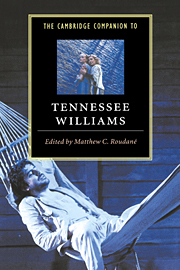Book contents
- Frontmatter
- Introduction
- 1 Early Williams
- 2 Entering The Glass Menagerie
- 3 A streetcar running fifty years
- 4 Camino Real
- 5 Writing in “A place of stone”
- 6 Before the Fall -and after
- 7 The sacrificial stud and the fugitive female in Suddenly Last Summer, Orpheus Descending, and Sweet Bird of Youth
- 8 Romantic textures in Tennessee Williams's plays and short stories
- 9 Creative rewriting
- 10 Seeking direction
- 11 Hollywood in crisis
- 12 Tennessee Williams
- 13 Words on Williams
- 14 The Strangest Kind of Romance
- Selected bibliography
- Index
4 - Camino Real
Williams's allegory about the fifties
Published online by Cambridge University Press: 28 May 2006
- Frontmatter
- Introduction
- 1 Early Williams
- 2 Entering The Glass Menagerie
- 3 A streetcar running fifty years
- 4 Camino Real
- 5 Writing in “A place of stone”
- 6 Before the Fall -and after
- 7 The sacrificial stud and the fugitive female in Suddenly Last Summer, Orpheus Descending, and Sweet Bird of Youth
- 8 Romantic textures in Tennessee Williams's plays and short stories
- 9 Creative rewriting
- 10 Seeking direction
- 11 Hollywood in crisis
- 12 Tennessee Williams
- 13 Words on Williams
- 14 The Strangest Kind of Romance
- Selected bibliography
- Index
Summary
During the fifties Williams's plays were eclectic. His two great box-office successes, Cat on a Hot Tin Roof (1955), which grapples with greed, mendacity, and homosexuality, and Sweet Bird of Youth (1959), an indictment of Southern bigotry, demonstrated his facility with naturalism. On the other hand, he wrote several non-naturalistic plays: The Rose Tattoo (1950), inspired by his relationship with Frank Merlo, a carnivalesque comedy celebrating the Dionysian; Camino Real (1953), an allegory about being trapped in a fascist state; Orpheus Descending (1957), a tragic love story set in a racist, brutally materialistic, dying South, Williams's version of the myth of Sisyphus; and Suddenly Last Summer (1958), in which Williams depicts the destructive nature of the writer and of homosexuality. Of the latter plays, Camino Real seemed the most egregiously misunderstood.
Williams's idea for Camino Real first came to him when he was sick in a desolate corner of Mexico. III, friendless, penniless, he felt as though he would never escape. He also thought that he would never be able to write a great play again:
I thought . . . that those “huge cloudy symbols of a high romance” that used to lift me up each morning . . . had gone like migratory birds that wouldn't fly back with any change of season. And so it was written to combat or to purify a despair that only another writer is likely to understand fully.
- Type
- Chapter
- Information
- The Cambridge Companion to Tennessee Williams , pp. 67 - 94Publisher: Cambridge University PressPrint publication year: 1997



